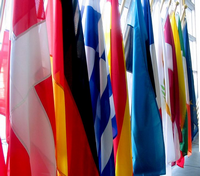Among the mutual recriminations ringing out between the U.S. and Europe regarding NATO's already stressed-out intervention in Libya, we have seen the usual raft of analyses regarding that military alliance's utility -- or lack thereof. As someone who has argued for close to a decade now that America will inevitably find that China, India and other rising powers make better and more appropriate allies for managing this world, I don't find such arguments surprising. You don't have to be a genius to do the math: Our primary allies aren't having enough babies and have chosen to shrink their defense budgets, while rising powers build up their forces and increasingly flex their muscles. In terms of future superpowers, beyond the "CIA" trio -- China, India and America -- nobody else is worth mentioning.
We can pretend that the trans-Atlantic bond will continue undiminished into the future, but it will not, because the alliance is no longer in either side's interest. When America looks at NATO, all it sees is Europe, and when Europe looks at NATO, all it sees is the United States. In other words, neither side perceives clear unity of purpose in the alliance anymore, but rather obligations based on outdated strategic calculations -- namely, the balancing of a Russia that continues on its pathway of steep decline.
But while the Eastward shift of geopolitical power makes NATO less relevant to America's global security calculus, the rise of two great powers in Asia also creates new triangulating possibilities for a Europe no longer tethered to a trans-Atlantic identity.

